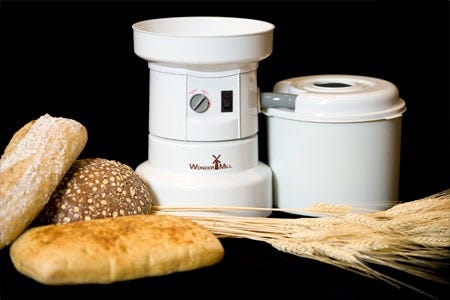Gift Guide 2015: The Wheat of the Matter

Grinding your own coffee beans yields a richer, more vibrant cup of coffee. Grinding your own spices has the same effect. But for serious bakers, grinding your own wheat is even more important, because it allows you to use organic grains and save the bran.
Anybody's who's read Dan Barber's wonderful book, The Third Plate, knows there's a kind of madness in buying all your meat and produce from the farmers' market - and then using commercial wheat for baking.
You can, of course, buy organic whole wheat. But just-milled wheat is sweeter, rounder and more expressive. Many commercial whole wheat flour producers skimp on bran content - which holds most of the nutrients- in order to prolong the flour's shelf life. And because the bran also contains the fat, commercial whole wheat flour is less flavorful than what you mill yourself.
It's hard to think of a better gift for an ambitious baker than a small grain mill. Not only will it help save money (bulk grain costs less) and bake bread with serious character, it also yields a more nutritious food.
Countertop mills aren't cheap, but the cost keeps going down. King Arthur Flour recommends the Wondermill, and I'm inclined to follow suit. (FYI, this King Arthur article, comparing breads made from whole wheat flour and freshly-milled flour is pretty illuminating.)
After that comes the fun part. What kind of wheat to grind, and where to buy it? Maine Grains, Central Milling and the ever-stalwart Anson Mills are great places to start. At the moment I'm particularly partial to Anson Mill's Red Fife whole wheat berries.



